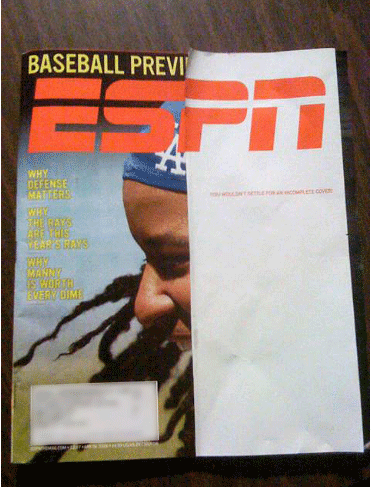Gatorade Files Lawsuit Against Powerade
Have false claims been made, or is it just sports drink envy? You be the judge

There’s an old fashioned brawl brewing in the sports drink industry. The undisputed champion, Gatorade, has filed a lawsuit accusing its perennial challenger, Powerade, of “knowingly misleading consumers and deceptively overstating the product benefits of its sports drink Powerade ION4.” The lawsuit is in response to a rash of bold Powerade ads which claim ION4 is an “upgrade” from Gatorade because the Powerade drink contains four electrolytic ingredients, whereas Gatorade contains only two, thus making Powerade a more “complete” drink. Gatorade contests that the “claim is complete in only one way – that it’s completely false.” Nice one.
A recent ESPN the Magazine cover showed just half the face of Manny Ramirez. The right half of the cover was plain white with small text stating, “You wouldn’t settle for an incomplete cover.” The inside cover had a large picture of a Gatorade bottle above the punch line: “then don’t settle for an incomplete sports drink.”
Potential implications of a magazine selling half its cover aside, it was aggressive marketing like this that prompted the lawsuit by Gatorade, which was filed in the US District Court in New York. Both sides agree that the ION4 formula includes potassium, sodium, calcium and magnesium, while Gatorade only includes sodium and potassium. The ION4 website claims that its formula puts back into athletes what they lose as they sweat, and in the exact proportions they lose it: 100 mg of sodium, 24.2 of potassium, 2.5 of calcium and 1.2 of magnesium. With calcium and magnesium in its formula, Powerade claims it’s created a more complete drink.
Gatorade’s response? Tap water contains higher concentrations of calcium and magnesium than ION4. Gatorade provided the plot shown below in responding to me via email, adding that the amount of calcium and magnesium accounts for just one half of a percent of the daily recommended allowances. Powerarde declined to comment on the Gatorade counterclaims, stating only that, “We stand behind our product and are prepared to defend Powerade’s role in hydrating consumers.”

Gatorade-Powerade ION4 Electrolyte Comparison
With Powerarde owned by Coca-Cola Co. and Gatorade backed by PepsiCo., there’s enough cash for this fight to go the distance. For Powerade, the attention it receives through the suit alone might justify the campaign. According to Nielsen, Powerade spent just 14 million dollars on media last year, while Gatorade spent 112 million dollars. Hopefully there’s a separate account for legal fees.